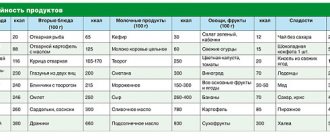According to scientific research, low-carb diets are among the most effective for weight loss and are also very healthy.
Moreover, what is curious: the positive effects of such diets are explained not only by the exclusion from the diet of unhealthy “simple” carbohydrates (refined sugar, for example), “charged” with empty calories, but also by a general decrease in the amount of carbohydrates, including “complex” ones. having a reputation for being helpful.
Below we will talk about how many carbohydrates you need per day when losing weight and how to correctly calculate their norm.
Main thoughts:
The human body has a hormonal mechanism that converts excess carbohydrates into fat; in addition, when there are a lot of simple carbohydrates in the diet, the hormonal mechanism for regulating appetite may be disrupted, which provokes overeating
The amount of carbohydrates per day when losing weight varies from 50 to 150 g per day. Below 50 g, metabolic health benefits begin to appear.
The amount of carbohydrates for weight loss is individual and determined by numerous factors, among which the level of physical activity and the rate of internal metabolism are of paramount importance.
For weight loss, what is of paramount importance is NOT the ratio of proteins, fats and carbohydrates, but the total calorie content of food
Any calculations of the ratio between proteins, fats and carbohydrates when losing weight are very inaccurate. Limiting the amount of carbohydrates is paramount, and the proportions of protein and fat can be varied
Why does the body need carbohydrates?
Carbohydrates are organic substances consisting of hydrogen, carbon and oxygen. A person is able to generate a source of energy on his own, but the main supply of strength comes from eating food.
Cereals contain 85% carbohydrates, sugar – 99%.
Carbohydrates are divided into 2 types:
- simple;
- complex;
The first type is found in sugar, honey, and sweets. Such substances are easily absorbed by the body and enter the bloodstream. Doctors recommend consuming these products in small quantities.
Complex carbohydrates include starch, fiber, dietary fiber, etc. They are absorbed more slowly. They are allowed to be consumed in sufficiently large quantities.
Functions of carbohydrates in the human body:
- provide energy;
- strengthen tissues;
- prevent the growth of bacteria in the stomach;
- break down fats;
- normalize the functioning of the immune system;
- participate in the formation of enzymes and the production of hormones.
Simple and complex carbohydrates: what is the difference?
The most dangerous and harmful carbohydrates are simple ones. But why? At the moment when foods containing carbohydrates with a high glycemic index (fructose, glucose, lactose, sucrose) enter the stomach, after a few minutes they turn into sugar, which will be in the blood. Elevated blood sugar levels are a rather dangerous phenomenon, which is why the body begins to defend itself and tries to correct it in a short period of time.
The easiest way out for the body in such a situation is to utilize excess sugar into fats. Sharp jumps in blood sugar causes a strong feeling of hunger and a great desire to eat sweet foods. In this way, a vicious circle is formed when a woman wants to lose weight, while adding kilograms from sweet foods, but can no longer give them up. This is precisely the main danger of simple carbohydrates.
But what are complex ones? This includes starch - plants, glycogen, which is the main source of energy for muscles, cellulose - fiber. Starch is a large number of simple carbohydrate molecules held together. Breaking down such food will require time and additional energy.
It is worth noting that dietary fiber has a complex and quite different structure, which is why it is not completely digested. But such food is very useful for our body; it has a positive effect on blood sugar and digestion.
What is important to know about carbohydrates to lose weight
The process of losing weight occurs when energy sources do not enter the body. It needs nutrients, which it takes from fat deposits.
Important! Eating excessive amounts of sugary foods increases insulin levels in the blood, which slows down the weight loss process.
Nutritionists strongly recommend avoiding the following foods:
- flour products and potatoes;
- chips, crackers, instant noodles, cereals;
- sweets;
- carbonated drinks, tea with sugar, coffee;
- fruits and berries rich in fructose: bananas, nectarines, plums.
Determining consumption
Remember that if you decide to go on a no-carb diet, you will essentially be eating more of the other macronutrients; You will be surprised, but if you get calories from these sources, you will still gain weight. Or, if you eat too few carbohydrates for your activity level, you may quickly run out of energy and end up unable to achieve your fitness goals.
To track your carbohydrate intake, follow these simple steps:
Read the labels
On packaged products, the amount of carbohydrates in grams is written on the labels in the “Composition” section. You'll also find calorie information there, but make sure you check the serving size and how many per package.
Calculate the number of grams of carbohydrates
Use the reference database to find out the amount of carbohydrates in fresh produce.
Keep a food diary
Keep a diary to track what you eat. You can use a notebook or online tracker to track foods and count calories. It would also be useful to accompany this with observations of mood, sleep quality and level of physical activity. In the long term, this will help you make connections between the foods you choose and their effect on your well-being and energy levels.
Calculation of the amount of carbohydrates per day
In order to find out the daily norm of energy sources, it is necessary to calculate how many calories a particular person should consume. Based on this figure, you can calculate how much carbohydrates he needs to receive.
Number of calories per gram of each macronutrient:
- Proteins – 30% of calories. 1 gram = 4 kcal.
- Fats – 30% of calories. 1 gram = 9 kcal.
- Carbohydrates – 40% of calories. 1 gram = 4 kcal.
If a person’s norm is 1500 kcal, then the table of proteins, fats and carbohydrates will look like this:
- proteins: (0.3*1500/4) = 113 g;
- fats: (0.3*1500/9) = 50 g;
- carbohydrates: (0.4*1500/4) = 150 g;
It is difficult to adhere to exact numbers, so an error of 5% of the established norm is allowed.
Carbohydrates: daily requirement
The required amount of energy sources depends on a person’s gender, weight and age.
More details about the daily diet can be found in the table:
| Category | Weight | |||
| 40-50 kg | 50-60 kg | 60-70 kg | 70-80 kg | |
| Man gaining weight | 283 g | 294 g | 305 g | 322 g |
| Man losing weight | 159 g | 163 g | 168 g | 173 g |
| Man maintaining body weight | 210 g | 287 g | 303 g | 323 g |
| Woman gaining weight | 203 g | 242 g | 258 g | 271 g |
| Woman losing weight | 118 g | 150 g | 165 g | 153 g |
| Woman maintaining body weight | 145 g | 187 g | 205 g | 217 g |
Energy value of food
The energy released is measured in kilojoules and is called calories. It is necessary to consume the daily norm of energy value.
Otherwise, the person loses or gains weight.
- Proteins: 1 gram = 16.7 kJ.
- Fat: 1 gram = 37.7 kJ.
- Carbohydrates: 1 gram = 16.7 kJ.
Based on these data, you can calculate the energy value of any product. Using wheat bread (second grade) as an example, let’s find the number of calories in 100 g.
It contains 7.1 g of protein, 1.1 g of fat and 46.4 g of carbohydrates. The energy value will be equal to: 16.7*7.1+ 37.7*1.1+46.4*16.7=934 kJ (234 kcal). The calorie content is written on packages of goods, but with fruits, vegetables and flour products you will have to calculate it yourself.
Daily calorie content is determined by the sum of the energy value of food eaten per day.
The correct ratio of proteins, fats and carbohydrates for weight loss
The universal rule for losing weight is as follows: what is of paramount importance is not the ratio of proteins, fats and carbohydrates, but the total calorie content of food during the day 3.4.
In order to lose weight, you need to create a calorie deficit, i.e. eat fewer calories than you burn during the day. At the same time, to maintain health, it is important to ensure the supply of necessary nutrients, the proportion of which always decreases with a decrease in calorie content (= volume of food eaten).
Read us on the networks
The ratio between proteins, fats and carbohydrates matters in the sense that some of them provide better satiety, i.e. They satisfy appetite better and are also richer in nutrients.
For example, protein foods have a high saturation index and therefore their consumption is recommended for weight loss. Digesting protein requires more energy than carbohydrates (the so-called “thermogenic effect”), which means there is less potential for fat deposition.
Also, a slight increase in protein allows you to avoid the destruction of muscle mass, which often occurs during weight loss.
It is sometimes believed that excess fat in food also promotes better satiety, but scientific research does not confirm this. We discussed this issue in an article about the effectiveness of low-carb diets for weight loss and health.
The same goes for fiber: the more foods containing it in our diet, the less we want to eat.
For weight loss, what is of paramount importance is NOT the ratio of proteins, fats and carbohydrates, but the total calorie content of food
We recommend : Which vitamins are better to take: synthetic or natural from products?
Example
The body's reaction to 100 calories of cabbage and cake differ radically.
Firstly, the serving size of cabbage with this calorie content is much larger than the size of a piece of cake, which means cabbage fills the stomach better, unlike cake, and satisfies hunger better.
Secondly, cabbage contains vitamins, minerals and fiber, which are almost completely absent in a piece of cake, which is also “loaded” with sugar and trans fats. The first is good for health, the second is harmful to it.
Thirdly, sweets cause a hormonal reaction - a sharp rise in insulin levels, and then an equally sharp decline, which causes a strong feeling of hunger and even more calorie consumption.
Fourth, excess sugar harms metabolic health, accelerates the aging process, is a factor in the development of cardiovascular diseases, leads to the formation of fatty liver, etc. etc., not to mention caries.
So, what would you prefer for lunch today: coleslaw or sweet junk?
What carbohydrates can you eat while losing weight?
When losing weight, it is necessary to exclude simple carbohydrates and consume complex ones. The latter are capable of dissolving into elemental sugar for up to several hours.
The breakdown of these organic substances occurs without increasing insulin in the blood, thanks to which a person does not feel hungry. The body spends a large amount of energy processing such products, burning extra pounds.
When losing weight, it is necessary to exclude simple carbohydrates and consume complex ones.
The diet must include food containing glycogen, starch, fiber, insulin and pectin. These substances are enzymes that can quickly break down glucose. Their responsibilities also include removing toxins from the stomach and intestines.
Products necessary for a diet containing “good” carbohydrates:
- whole grain bread or bran;
- pasta;
- cereal porridges;
- vegetables (carrots, beets, potatoes, onions);
- beans, soybeans, peas;
You can’t categorically refuse sweets. It is recommended to eat only real dark chocolate.
Fibrous carbohydrates
Fibrous carbohydrates must be eaten during a diet, as they are low in calories, but quickly fill a person. This type also burns fat well.
They are most often found in green vegetables:
- cucumbers;
- broccoli;
- asparagus;
- mushrooms;
- tomatoes;
- pasta;
- Red beans.
To quickly lose weight, girls use lean proteins and fibrous carbohydrates in their diet.
This combination gives quick weight loss, but if a person needs to gain muscle mass, then he should not eat food with these organic substances.
Sweet carbohydrates
This is the name given to simple carbohydrates that have a sweet taste.
Excessive consumption of products containing such an organic compound is harmful to human health. They are quickly broken down in the blood, producing insulin, which is then converted into fat cells.
When dieting, you should avoid foods containing glucose, fructose, and sucrose:
- confectionery;
- sweet carbonated drinks and juices;
- semolina and rice porridges.
Attention! After drinking a small can of Coca-Cola, a person consumes 9 tablespoons of sugar, a cup of latte – 7 tablespoons.
Starchy carbohydrates
Starchy carbohydrates
Starchy carbohydrates help you not feel hungry for a long time. With limited consumption of starchy foods, a person will not gain weight.
These include:
- oatmeal, barley;
- rice, buckwheat;
- legumes (peas, beans).
Understanding Carbohydrates
Carbohydrates, sometimes abbreviated as “coals,” are one of three macronutrients obtained from food that provide your body with energy. Carbohydrates, proteins and fats make up the total calories consumed.
Carbohydrates are found mainly in plants, where they provide energy and structure. Sugars, starches and fiber fall under this category; you won't find carbohydrates in meat, fish or poultry. However, they are found in milk and dairy products because they contain lactose, which is a type of sugar.
Rules for consuming healthy carbohydrates for weight loss
Healthy carbohydrates are complex organic substances; they are the ones that need to be included in your diet when losing weight.
You need to know a number of rules, without which the desired result cannot be achieved:
- Simple carbohydrates should make up only 15% of the components consumed. The remaining 85% is starchy.
- It is necessary to eat vegetables and fruits rich in fiber.
- To lose weight, it is important to consume proteins together with carbohydrates, as they will help gain lean body mass.
- You should not eat a lot of food at one time. It is better to break your meals into several parts and eat in small portions.
- Confectionery products are best consumed in the morning, before lunch. In the evening, sucrose is poorly absorbed by the body, which causes unnecessary fat mass to appear.
When creating any diet, it is necessary to include a combined set of products. You can’t eat just one thing, like rice. When dieting, it is necessary to include vegetables and grains in the diet.
How to lose weight easily
There is one golden rule, if you follow it, you can easily get rid of extra pounds.
By giving up harmful carbohydrates, you will take a huge step towards the desired result. To date, no magazines or articles can indicate the daily carbohydrate intake for men and women. For this reason, we will describe some good recommendations.
From 100 to 150 grams of carbohydrates per day. This amount applies to those who have a good body shape, do not suffer from extra pounds and plan to maintain their health and weight. You can eat the following carbohydrate foods:
- Any vegetables.
- Any fruit.
- A little starchy food - potatoes, rice with oats.
From 50 to 100g. This option is suitable for those who want to lose excess weight without torturing their body by giving up carbohydrate foods. You are allowed:
- Vegetables.
- No more than 3 fruits per day.
- Virtually eliminate starchy foods.
From 20 to 50g. The presented amount of carbohydrates is allowed for those who suffer from diabetes and excessive excess weight. If you consume less than 50 grams of carbohydrates per day, then your body has an excess level of ketone bodies. In other words, it begins to give energy to the brain through ketone bodies. Because of this, appetite disappears, and excess weight begins to disappear. The following products are allowed to be consumed:
- Vegetables.
- Berries.
- Avocado.
- Nuts and seeds.
Thus, you can see that there is no need to be afraid of foods containing carbohydrates when losing weight. You just need to figure out where and how many of them are contained, determining for yourself an individual acceptable norm. In any case, even if you decide to lose weight using a seemingly safe and health-friendly method, consult your doctor first, or better yet, visit a nutritionist who will calculate your own daily carbohydrate intake and tell you what will be beneficial specifically for your body, and what it would be desirable to refuse.
How many carbohydrates do you need per day when losing weight?
Depending on how long a person wants to lose excess weight, nutritionists draw up the daily intake of foods containing carbohydrates:
- 100-150 g. Average value, which is suitable for maintaining mass. Further reduction in the norm will lead to weight loss.
- 50-100 g. By taking this amount of carbohydrates, a person will begin to lose kilos without feeling it. It is only important to maintain a diet and eat food that does not leave you feeling hungry for a long time.
- 20-50 g. This amount will lead to weight loss in a short time.
Important! You cannot start losing weight without the help of a nutritionist, as a lack of substances can lead to serious disorders in the body. A famous example of the consequences of dieting is anorexia. In most cases, if this disease is not overcome, death occurs.
The type of life a person leads plays a big role. During physical activity, nutritionists believe that it is necessary to consume 4 g of carbohydrates per kilogram of a person’s weight.
It is important to exercise, otherwise the weight will not come off. In the absence of physical activity, the norm drops by half - to 2 g per kilogram of body weight.
Daily carbohydrate calculator
To ensure that you do not make a mistake in the mass of substances you need and correctly calculate calories, you can use a special carbohydrate calculator. All you need to do is enter the necessary parameters:
- What's your gender;
- age;
- height;
- weight;
- level of physical activity (from none to very heavy);
The system will analyze the data you entered and show how many carbohydrates you need per day when losing weight, the amount of protein, and fat. It is very convenient to use such a service; it takes into account various factors that influence the required content of elements in food, helping to obtain the correct distribution option. If you follow the recommendations, you can lose weight without much effort.
Consequences of a lack of carbohydrates
With a lack of carbohydrates, the body begins to signal a malnutrition. First of all, the body begins to take energy from proteins. Because of this, they cannot perform their functions: synthesize new cells and tissues, produce antibodies and hormones.
Many diets are based on eliminating foods rich in carbohydrates. However, their absence in the body can disrupt the process of burning fat deposits, and the person, on the contrary, will gain weight.
Due to the lack of these components, a person experiences nausea, accompanied by vomiting, headaches, lethargy and fatigue.
Low carb diets
Modern nutritionists often prescribe low-carbohydrate diets to patients. Their advantages are:
- lack of hunger, prolonged satiety;
- restrictions only on certain food groups (pasta, sugar, bread);
- appetite control;
- hormonal improvements;
- weight loss without effort;
- healing the body - reducing sugar levels, cholesterol, normalizing blood pressure.
The most effective and well-known carbohydrate-free diets are:
- Atkins;
- protein;
- Kremlin;
- Protasova.
All of them are based on the principle of reducing carbohydrate consumption and replacing them with fats and proteins. Energy for processes is drawn from excess fat, which helps to lose weight. Basic rules of low-carb diets:
- Refusal of cereals and bread. Because of this, diets do not last long, because such a refusal can lead to serious energy disorders in the body. This is a minus.
- Include lean meat, lean fish, seafood, low-fat dairy products, vegetables, and herbs.
- Ban on bread, pasta, sweets, starch, rice, potatoes.
- The daily carbohydrate intake is 40 g.
- You should drink 2-3 liters of water per day.
- Physical exercise is beneficial.
Calculation of calorie content and ratio of BZHU
To maintain or lose weight, it is important to know how many calories you need to consume daily.
You can use the following simple algorithm:
- Multiply the mass of a person by 10.
- Human height multiplied by 6.25.
- Add the results of steps 1 and 2.
- Number of years multiplied by 4.9.
- Subtract the result of the calculations in step 4 from the number obtained in the calculation of step 3.
- For men, add the number 5 to the result of step 5, for women, subtract 160.
- The resulting number in step 6 is multiplied by the physical load coefficient:
- In the absence of physical activity, it is equal to 1.2.
- If a person walks a lot, sometimes goes to the pool or does exercises at home, then the coefficient is 1.4.
- If you exercise several times a week – 1.6.
- If a person trains daily and is highly active, then the result obtained in step 6 is multiplied by 1.7.
Protein products
Proteins serve a person to convert fats into energy.
Protein products
When losing weight, it is important to eat foods containing proteins (meat, fish). The components included in these products help to gain muscle mass and also cleanse the body of waste and toxins.
Benefits of eating protein:
- improvement of heart function;
- decreased feeling of hunger;
- removal of excess fluid, which can be deposited in the form of fat reserves;
- improvement of metabolism.
Allowed foods include: chicken, seafood and low-fat dairy products. Among vegetables and fruits, eggplants, avocados, and apples are rich in proteins. A protein diet helps you quickly get rid of extra pounds, but other organic components cannot be completely eliminated.
Fats: get rid of them or leave them
It is not recommended to completely give up fat during a diet, as the person will have difficulty thinking and feel tired.
When dieting, it is recommended to consume foods containing omega-3 fatty acids: salmon, tuna, cabbage, walnuts, parsley.
They perform the following functions:
- improve human memory;
- reduce the likelihood of developing cancer;
- fight fatigue;
- reduce the load on the heart and joints;
- increase skin protection, reducing the load on the skeleton.
Determination of calorie norm
For those who want to lose weight or gain muscle mass, there is a common desire to speed up this process, which often leads to the fact that the daily carbohydrate intake is reduced to the maximum level, and sometimes set lower. This is often a big mistake, because the human body spends calories not only for physical activity, but also to maintain its functions. To calculate the amount of carbohydrates, proteins and fats per day for women, you need to remember the basic rules:
- For the age group 18 - 25 years old, the daily intake should be 2000 - 2500 kilocalories.
- For ages 26–50 years, the norm is to consume 1850–2000 kilocalories of fat, protein, and carbohydrates per day.
- For those 50 years and older, the daily intake of carbohydrates, proteins and fats depends on the type of activity. If there is physical activity, then you need to eat up to 2000 kilocalories per day. If physical activity is small, then no more than 1800 kilocalories per day.
Man required:
- at 19 – 30 years old, the basic norm is 2400 kcal per day;
- at 30 – 50 years old the norm per day is 2200 kcal;
- after 50 years, the need for carbohydrates, proteins and fats is 2000 kcal per day.
If you sharply reduce your caloric intake below the minimum level, this can lead to serious health problems.
Mifflin San Geor calculation formula
American nutritionists have been relying on this formula for over a decade. It is based on the equally well-known and already classic Harris-Benedict formula. The average load on the body, gender, age and weight are taken into account, as well as the daily carbohydrate intake for a person.
Calculation example:
- For men: weight in kilograms multiplied by 10 plus height in centimeters multiplied by 6.5 plus age in years multiplied by 5 and plus another 5. Example 80*10+170*6.5+30*5+5 = 2060 kcal.
- For girls: weight in kg multiplied by 10 plus height in cm multiplied by 6.5 plus age in full years multiplied by 5 and minus 161. Example: 90*10+180+6.5+35+5-161 = 1100
If we count according to the simplified version, the result is approximate. Therefore, the calculation was later improved.
- for men: (weight * 10 + height in centimeters * 6.5 + years of life * 5 + 5) * A;
- women: (weight * 10 + height * 6.5 + age * 5 - 161) * A.
The “A” value refers to the level of physical activity. Depending on the loads, certain values have been developed:
- physical activity is absent or its amount is not significant – 1.2;
- low physical activity – 1.375;
- physical education classes at an average level – 1.55;
- high activity, constant sports – 1.725;
- weightlifting, active gain of muscle mass – 1.9.
Harris Benedict Formula
Calculates the amount of proteins, fats and carbohydrates per day. It was brought out at the beginning of the twentieth century. The formula is also based on three main parameters: weight, age and height. The basal metabolic rate is being calculated to determine how much fat you should consume in one day. This calculation can be used by men to calculate calories when building muscle mass.
The essence of the formula is to calculate basal and active metabolisms.
- basal metabolism for a girl is determined by the formula: 655.0955 + (9.5634 * weight in kilograms) + (1.8496 * height in centimeters) – (4.6756 * years of life);
- basal metabolism for men: 66.4730 + (13.7516 * weight) + (5.0033 * height) – (6.7550 * age).
An active metabolism comes from the lifestyle a person leads:
- if physical exercise is reduced to zero – 1.2;
- small or infrequent physical activity – 1.375;
- average load – 1.55;
- high activity, constant sports – 1.725;
- very heavy load – 1.9.
At the last stage, the two values need to be multiplied, the resulting result is the average rate of calories consumed.
Calculation of BZHU
BJU per day is calculated for women and men based on how many calories they should receive per day. The basis is the norm of carbohydrates, fats and proteins in terms of calorie content, which is considered optimal. 1 gram of protein = 4 kcal; 1 g fat = 9 kcal; 1 g carbohydrates = 4 kcal.
We take the proportions 3:2:5 and get 10.
The daily amount of calories is 1600 kcal. Divides into 10 servings. The result is 160 kcal per part. Next, you need to multiply the result by kcal for each item.
- proteins 160 * 3 = 480 kcal;
- fats 160* 2 result 320 kcal;
- carbohydrates 160 * 5 we get 800 kcal.
Latest serving calculation by grams:
- Divide 480 by 4, you get 120 g of proteins;
- Divide 320 by 9, we get 35.6 g of fat;
- 800 divided by 4 equals 200 g of carbohydrates.
Beneficial properties of carbohydrates and their effect on the body
Carbohydrates are not only an excellent food source of energy for the body, but are also included in the structure of cell membranes, cleanse the body of toxins (cellulose), and participate in protecting the body from viruses and bacteria, playing an important role in creating strong immunity. Used in various types of production. In the food industry, for example, starch, glucose and pectin are used. Cellulose is used for the production of paper, textiles, and also as a food additive. Alcohols obtained by fermenting carbohydrates are used in medicine and pharmacology.
Which carbohydrates do you prefer?
In the diet, it is necessary to observe the proportion of quickly and slowly digestible carbohydrates. The first ones are good when it is necessary to quickly obtain a certain amount of energy intended to perform a specific job. For example, in order to prepare faster and better for exams. In this case, you can consume a certain amount of quickly digestible carbohydrates (honey, chocolate, candy, etc.). Athletes also consume “fast” carbohydrates during and after performances to quickly restore strength.
If the work may take a long time, then in this case it is better to consume “slow” carbohydrates. Since their splitting requires more time, the release of energy will extend over the entire period of work. If, in this case, you consume quickly digestible carbohydrates, and in the amount necessary to perform long-term work, irreparable things can happen.
Energy will be released quickly and massively. And a large amount of uncontrollable energy is like ball lightning, which can cause irreparable harm to health. Often, the nervous system suffers from such a release of energy, in which a simple short circuit can occur, as in conventional electrical networks. In this case, it begins to malfunction and the person turns into a nervous creature who is not able to perform precise actions involving fine motor skills of the hands.
Dangerous properties of carbohydrates and warnings
Signs of a lack of carbohydrates in the body
Depression, apathy, and loss of strength can be the first signals of a lack of carbohydrates in the body. If nutrition is not normalized by adjusting the diet with the required amount of carbohydrate foods, the condition may worsen. The next stage is the destruction of vital proteins in the body. All this is caused by toxic damage to the brain suffering from a lack of carbohydrates. Doctors call this disease ketosis.
Signs of excess carbohydrates in the body
Hyperactivity, excess weight, body tremors and inability to concentrate may indicate excess carbohydrates in the body. First of all, the nervous system suffers from an excess of carbohydrates.
The second organ suffering from an excess of energy is the pancreas. It is located in the left hypochondrium. The body of the gland is an elongated formation 14-22 cm long and 3-9 cm wide. In addition to the fact that it produces pancreatic juice, rich in enzymes necessary for digestion, it is also involved in carbohydrate metabolism. This occurs thanks to the so-called islets of Langenharts, which cover the entire outer surface of the gland. They produce a substance colloquially called insulin. It is this pancreatic hormone that determines whether a person will have problems with carbohydrates or not.
Frequent and excessive consumption of foods that increase insulin levels in the blood (“fast” carbohydrates) can cause type II diabetes, hypertension and cardiovascular diseases.
What is the glycemic index?
Today, much attention is paid to the glycemic index of foods. Most often, such data is used by athletes and other people who dream of being healthy and getting slim. The glycemic index (GI) is a measure of how much a food raises blood sugar levels. Glucose is taken as the absolute value, with a GI of 100%. Foods with a high GI most often include foods containing simple carbohydrates; complex carbohydrate foods usually have a low GI.
Many of you are aware of a disease called diabetes. For some, fortunately, it has passed, while other people are forced to drink and give themselves insulin injections for many years. This disease is caused by insufficient amounts of the hormone insulin in the body.
What happens when the amount of glucose supplied is higher than the required level? Additional portions of insulin are sent for its processing. But it is necessary to take into account that the Langengarts islands, which are responsible for its production, have one unpleasant feature. When the insulin contained in one or another islet rushes to meet a portion of carbohydrates, the islet itself shrinks and no longer produces insulin.
It would seem that other islands should take its place and continue its great mission. But no, as a result of modern ecology, our body has lost the ability to produce new islets. Therefore, to avoid diabetes at the very peak of your life, you should not consume large amounts of quickly digestible carbohydrates. It is better to think about those carbohydrates that will not harm you, and their consumption will bring you a good mood and an active lifestyle for many years.
Carbohydrates in the fight for slimness and beauty
For those who want to stay slim and fit, nutritionists recommend eating slowly digestible carbohydrates, which are found in vegetables, including legumes, some fruits and cereals. These foods take longer to be absorbed by the body and, therefore, the feeling of fullness is maintained for a long time.
As for the energy value of carbohydrates, it is calculated as follows.
Since 1 gram of carbohydrates can produce energy in the amount of 4.1 kilocalories, then with an active lifestyle (the daily norm is 125 grams), a person will receive 512.5 kilocalories from consumed carbohydrates. A less active person will need only 410 kilocalories, with a daily carbohydrate intake of 100 grams.
Carbohydrates and health
Below we present a sample list of products that you should pay special attention to. These are slow-digesting carbohydrates that can provide maximum benefits to your health.
In first place we have oatmeal, rice and buckwheat porridge. Then come rye and wheat bread made from wholemeal flour. Next, our list continues with peas and beans. And it ends with potatoes and pasta made from durum wheat.
As for “fast” carbohydrates, instead of cakes and pastries, eat one banana, some dates, raisins, or a spoonful of buckwheat or linden honey. This amount will be enough to perform short, but energy-requiring work.
Well, we conclude, and we hope that your reason and sense of proportion will preserve your health for many years. I wish you health and longevity!
We have collected the most important points about carbohydrates in this illustration and would be grateful if you share the picture on a social network or blog with a link to this page:
Tatyana Eliseeva chief editor of the Food+ project
Ask a Question
Rating:
9.7
/10
Votes: 10
Usefulness of the material 9.5
Reliability of information 10
Formatting of Article 9.7
Drawing up the proportion of BZHU
What ratio of BZHU for weight loss should be? The average woman leading an active lifestyle requires 1 to 1.5 g of protein per 1 kg of weight. The proportion looks like 25:20:45. In fact, there is no standard scheme; the percentage depends on the individual data and lifestyle of the person. If a woman engages in strength training, the amount of protein increases proportionally for each kilogram of weight.
If you need to lose weight faster, the amount of protein increases at the expense of carbohydrates, but not the calorie content. Eating at 1000 kcal per day or less is dangerous to health. Due to the large amount of muscle mass, the stronger sex requires more protein. Therefore, the ratio of BZHU for weight loss for a man will be different. For every kilogram of weight there is 1.5 g of protein. Professional bodybuilders use 2 g, 3 and in rare cases 4 g, but this is no longer very good and even dangerous. BJU per day for weight loss for men is approximately 35:15:50 or 30:15:55.
Important! The body cannot absorb more than 30 g of protein at a time, so the norm must be distributed evenly over several meals.











